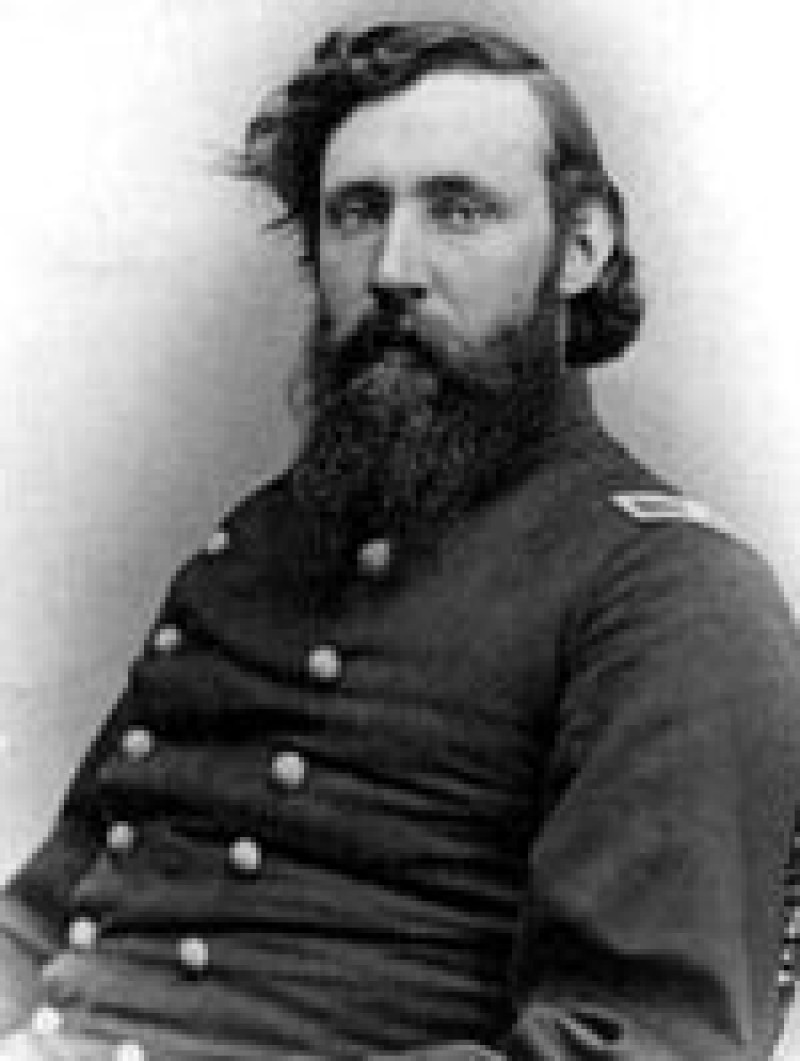Joseph Warren Keifer (Jan. 30, 1836 - April 22, 1932)
Joseph Warren Keifer, soldier, congressman, and Speaker of the U.S. House of Representatives, was born near Springfield, Ohio. Keifer was educated at home and in the district school. He taught for one term (1852-1853), worked on the family's farm and attended nearby Antioch College (1854-1855). In 1856, after studying some on his own, he began reading law with a Springfield firm and was admitted to the bar in January 1858. Following a two-month tour of various Midwestern cities, evaluating them as possible sites for relocation, Keifer returned to practice law in Springfield, where he remained for the rest of his life.
The outbreak of the Civil War was the defining experience of Keifer's life. An able and valorous soldier, he remained in the army throughout the war, despite being wounded four times. He enlisted on April 19, 1861, and was commissioned a major. He was subsequently promoted to lieutenant colonel and brevetted as a brigadier general in October 1864. After participating in the battles at Petersburg and Richmond, he was promoted to major general on April 9, 1865.
Mustered out of the army on June 26, 1865, Keifer resumed his legal career, but he also became active in veterans' affairs and in politics. He served the Grand Army of the Republic (GAR) as commander of the Department of Ohio, 1868-1870, and junior vice commander, 1871-1872. He also helped set up the Soldiers and Sailors' Orphans Home in Xenia in 1868 and was a trustee of this institution from 1870 to 1878 and again in 1903-1904. His political involvement began when he organized a Bohemian Club of fellow Republicans that for 30 years shaped public affairs in Clark County. Elected to the state Senate in 1867, he served in the 1868-1869 session as a member of the important Judiciary Committee. He supported the 14th and 15th amendments and defended the principles of universal suffrage and political equality.
An active stump speaker, Keifer served as a delegate to the GOP National Convention in 1876 and that year was elected to the first of his seven terms in the U.S. House of Representatives. Keifer's prominence in Congress grew because of factional connections in the party as well as his increased seniority and experience. Keifer felt that his term was successful and later touted various legislative measures passed during the two years, but except for the civil service reform, none of the measures was especially notable.
Keifer returned to military service during the Spanish-American War when President William McKinley appointed him major general on June 9, 1898. He commanded the 7th Army Corps and the American forces that marched into Havana after Spanish forces withdrew on Jan. 1, 1899. He returned to private life on May 12. Keifer again became active in veterans' affairs, serving as the first commander in chief of the Spanish American War Veterans from 1900 to 1901 and in 1903 and 1904 as the Ohio commander of the Loyal Legion.
In 1904 Keifer returned to Congress, where he remained until his defeat in 1910. He was also a delegate to the 1908 national convention. He championed some of the same issues that had concerned him before. In particular, he criticized southern states' disfranchisement of blacks and argued that they should, as a result, have their representation reduced. Like a number of Civil War veterans active in politics after 1900, Keifer was a strong advocate of peace. While celebrating the causes for which he had fought, he believed that war had grown too deadly and awful to be permitted any longer.
Following his final electoral defeat in 1910, Keifer returned to Springfield, continuing his legal practice with two of his three sons until 1923. A life member of the Ohio Archaeological and Historical Society, he was the author of various historical and literary studies. Keifer died in Springfield.
Biography of Joseph Warren Keifer (Jan. 30, 1836 - April 22, 1932)
Citation: Philip R. VanderMeer. "Keifer, Joseph Warren"; http://www.anb.org/articles/05/05-00397.html; American National Biography Online Feb. 2000. Access Date: Fri Oct 3 11:51:13 2003. Copyright © 2000 American Council of Learned Societies. Published by Oxford Univeristy Press. All Rights Reserved.

